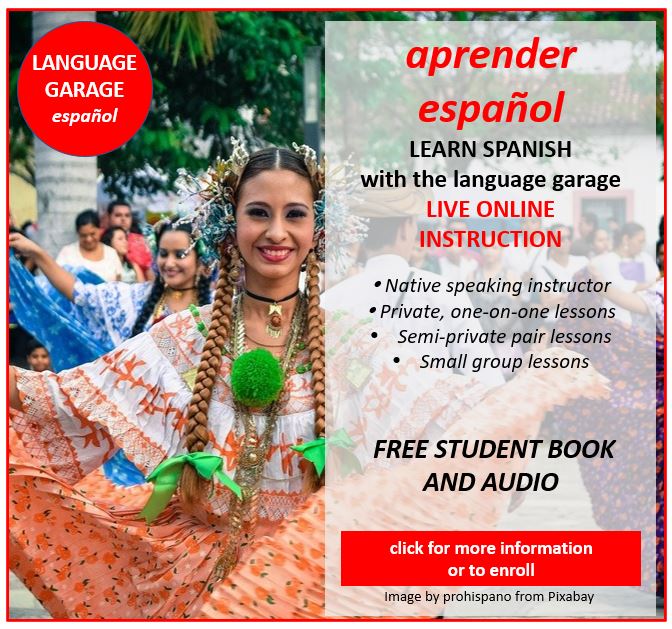Spanish Stem-Changing Verbs in the Present Tense
In this post we’re going to look at Spanish stem-changing verbs in the present tense. As you probably know, most Spanish verbs follow a regular conjugation pattern. These verbs fall into three major categories, –ar verbs, –er verbs, and –ir verbs. There are also a number of irregular verbs. Stem-changing verbs are regular, but they undergo a vowel change in their stem when they’re conjugated.
First, we’ll start by defining stem changing verbs and putting them into three categories so that you can master them more easily. Then we’ll look at each group and see how the verb stem vowels change. Next we’ll see several common verbs and example sentences for each group. Finally, for each group, we’ll wrap up with a few practice exercises so that you can test yourself.
What Are Spanish Stem-Changing Verbs?
First let’s define stem-changing verbs. Stem-changing verbs are verbs whose root (or stem) undergoes a vowel change when conjugated in the present tense. This change happens in all forms except for nosotros and vosotros.
Spanish stem changing verbs can be divided into three categories, based on the how the stem vowels change:
- e → ie: entender > entiendo (to understand, I understand)
- o/u → ue: mostrar > muestro (to show, I show); jugar > juego (to play, I play)
- e → i: pedir > pido (to ask for, I ask for)
Notice that stem changing verbs can be of any of the three major conjugation groups: mostrar is an –ar verb, entender is an –er verb, and pedir is an –ir verb. They follow the regular endings of their particular group, with a pattern of stem vowel changes shared across all three groups. Now let’s look at each category.
Group 1. e → ie Stem-Changing Verbs
For verbs in this category, the e in the stem changes to ie in all forms except nosotros and vosotros.
| pensar (to think) | empezar (to begin) | ||
| yo | e > ie | pienso | empiezo |
| tú | e > ie | piensas | empiezas |
| él/ella/usted | e > ie | piensa | empieza |
| nosotros/as | pensamos | empezamos | |
| vosotros/as | pensáis | empezáis | |
| ellos/ellas/ustedes | e > ie | piensan | empiezan |
Common e > ie stem changing verbs are: advertir (to warn), ascender (to go up), aterrar(to terrify), atravesar (to cross), calentar (to heat), cerrar (to close), comenzar (to begin), confesar (to confess), defender (to defend), descender (to go down), despertarse (to wake up), divertirse (to have fun), empezar (to begin), encender (to turn on), encerrar (to enclose), entender (to understand), enterrar (to bury), gobernar (to govern), mentir (to lie), nevar (to snow), pensar (to think), perder (to lose), preferir (to prefer), quebrar (to break), querer (to want), recomendar (to recommend), regar(to water), sentarse (to sit down), sentir (to feel), temblar (to shake), tentar (to tempt), tropezar (to trip).
Now let’s see a few example sentences.
- Cierro la puerta cuando salgo de casa.
I close the door when I leave home. - ¿Quieres ir al cine conmigo?
Do you want to go to the movies with me? - Preferimos comer en casa.
We prefer to eat at home. - ¿A qué hora te despiertas?
What time do you wake up? - La película comienza en cinco minutos.
The film begins in five minutes.
Practice 1
A. Give the full conjugations of: perder (to lose), sentir (to feel), cerrar (to close). Answers are below.
B. Complete each sentence with the correct form of the verb in parentheses. Then translate.
- Tú ___ la puerta. (cerrar)
- Nosotros ___ en nuestras vacaciones. (pensar)
- Ella ___ aprender español. (querer)
- El partido ___ a las ocho. (comenzar)
- Yo te ___ este restaurante. (recomendar)
- Ellos ___ mucho en la fiesta. (divertirse)
- ¿Tú ___ la lección de matemáticas? (entender)
- Yo ___ comer ensalada en vez de pizza. (preferir)
- Ustedes ___ en la primera fila. (sentarse)
- Él ___ sobre su edad. (mentir)
Group 2. o (u) → ue Stem-Changing Verbs
For these verbs, the o in the stem changes to ue in all forms except nosotros and vosotros.
| dormir (to sleep) | mostrar (to show) | ||
| yo | o > ue | duermo | muestro |
| tú | o > ue | duermes | muestras |
| él/ella/usted | o > ue | duerme | muestra |
| nosotros/as | dormimos | mostramos | |
| vosotros/as | dormís | mostráis | |
| ellos/ellas/ustedes | o > ue | duermen | muestran |
Common o > ue stem changing verbs are: acordar (to agree), acostarse (to go to bed), almorzar (to eat lunch), apostar (to bet), aprobar (to approve), contar (to count), costar (to cost), demoler (to demolish), demostrar (to demonstrate), desaprobar (to disapprove), descontar (to discount), doler (to hurt), dormir (to sleep), encontrar (to find), envolver (to wrap), morir (to die), morder (to bite), mostrar (to show), mover (to move), poder (can, to be able), probar (to try), recordar (to remember), renovar (to renew), resolver (to solve), soler (to be used to), sonar (to sound), soñar (to dream), volar (to fly), volver (to return).
There are two other verbs that belong in this category, with minor differences. In jugar (to play), the stem vowel change is u > ue instead of o > ue. And in oler (to smell), the o changes to hue instead of ue.
| jugar (to play) | oler (to smell) | |
| yo | juego | huelo |
| tú | juegas | hueles |
| él/ella/usted | juega | huele |
| nosotros/as | jugamos | olemos |
| vosotros/as | jugáis | oléis |
| ellos/ellas/ustedes | juegan | huelen |
Now let’s see a few example sentences.
- Mi hermano duerme ocho horas cada noche.
My brother sleeps eight hours every night. - No puedo ir a la fiesta esta noche.
I can’t go to the party tonight. - Nosotros almorzamos a las doce.
We eat lunch at twelve. - Los niños juegan en el parque todos los días.
The kids play in the park every day. - Las rosas huelen muy bien.
Roses smell really good.
Practice 2
A. Give the full conjugations of: poder (can), jugar (to play), soñar (to dream). Answers are below.
B. Complete each sentence with the correct form of the verb in parentheses. Then translate.
- Yo ___ ocho horas cada noche. (dormir)
- Ella me ___ sus fotos de las vacaciones. (mostrar)
- Nosotros ___ en un restaurante los domingos. (almorzar)
- Tú siempre ___ los nombres de las personas. (recordar)
- Él me ___ una historia interesante. (contar)
- Ellos ___ temprano del trabajo. (volver)
- ¿Tú ___ tus llaves? (encontrar)
- Los niños ___ en el parque después de la escuela. (jugar)
- Yo ___ la sopa antes de servirla. (probar)
- El pájaro ___ sobre el lago. (volar)
Group 3. e → i Stem-Changing Verbs
For these verbs, the e in the stem changes to i in all forms except nosotros and vosotros.
| pedir (to ask for) | repetir (to repeat) | ||
| yo | e > i | pido | repito |
| tú | e > i | pides | repites |
| él/ella/usted | e > i | pide | repite |
| nosotros/as | pedimos | repetimos | |
| vosotros/as | pedís | repetís | |
| ellos/ellas/ustedes | e > i | piden | repiten |
Common e > i stem changing verbs are: decir (digo) (to say/tell), despedirse (to say good-bye), elegir (to choose), gemir (to moan, groan, whimper), impedir (to prevent), medir (to measure), pedir (to ask for), reír (to laugh), repetir (to repeat), seguir (to follow, continue), servir (to serve), sonreírse (to smile), vestirse (to dress).
Remember that the accent shifts from the infinitive ending to the changed stem vowel in reír and sonréir: (son)río, (son)ríes, ríe, reímos, reís, ríen.
Now let’s see a few example sentences.
- Siempre pido un café por la mañana.
I always order a coffee in the morning. - Él repite la pregunta.
He repeats the question. - Nosotros seguimos las instrucciones del profesor.
We follow the teacher’s instructions. - Nunca sigues las instrucciones.
You never follow the instructions. - Mis amigos siempre se ríen de mis chistes.
My friends always laugh at my jokes.
Practice 3
A. Give the full conjugations of: pedir (to ask for), servir (to serve), decir (to say). Answers are below.
B. Complete each sentence with the correct form of the verb in parentheses. Then translate.
- Yo ___ las instrucciones del profesor. (seguir)
- Ella me ___ la verdad. (decir)
- Nosotros ___ con ropa elegante para la cena. (vestirse)
- Tú siempre ___ cuando estás feliz. (sonreírse)
- Ellos ___ la misma canción todos los días. (repetir)
- ¿Tú ___ ayuda con la tarea? (pedir)
- El camarero nos ___ la comida rápidamente. (servir)
- Yo ___ mi altura en centímetros. (medir)
- Nosotros ___ mucho con esa película. (reír)
- El bebé ___ cuando tiene hambre. (gemir)
Get on the road to speaking Spanish with the Language Garage!
We hope you’ve enjoyed learning about Spanish stem changing verbs. If you’d like to learn more:
- Follow us on Facebook, LinkedIn, BlueSky, Twitter, Threads, Instagram, or Pinterest. We publish lots of Spanish vocabulary, grammar, and culture notes, so it’s a great way to pick up some new vocabulary and practice.
- Check out our other posts on Spanish language, culture, and more.
- Enroll in affordable, flexible, and personalized private online Spanish lessons or sign up for a small group online Spanish class.
- Create a free Language Garage account to access tons of Spanish vocabulary, grammar, and culture.
Answers
1A
perder: pierdo, pierdes, pierde, perdemos, perdéis, pierden; sentir: siento, sientes, siente, sentimos, sentís, sienten; cerrar: cierro, cierras, cierra, cerramos, cerráis, cierran
1B
- Tú cierras la puerta. (You close the door.)
- Nosotros pensamos en nuestras vacaciones. (We think about our vacation.)
- Ella quiere aprender español. (She wants to learn Spanish.)
- El partido comienza a las ocho. (The game starts at eight.)
- Yo te recomiendo este restaurante. (I recommend this restaurant to you.)
- Ellos se divierten mucho en la fiesta. (They have a lot of fun at the party.)
- ¿Tú entiendes la lección de matemáticas? (Do you understand the math lesson?)
- Yo prefiero comer ensalada en vez de pizza. (I prefer to eat salad instead of pizza.)
- Ustedes se sientan en la primera fila. (You all sit in the first row.)
- Él miente sobre su edad. (He lies about his age.)
2A
poder: puedo, puedes, puede, podemos, podéis, pueden; jugar: juego, juegas, juega, jugamos, jugáis, juegan; soñar: sueño, sueñas, sueña, soñamos, soñáis, sueñan.
2B
- Yo duermo ocho horas cada noche. (I sleep eight hours every night.)
- Ella me muestra sus fotos de las vacaciones. (She shows me her vacation photos.)
- Nosotros almorzamos en un restaurante los domingos. (We have lunch at a restaurant on Sundays.)
- Tú siempre recuerdas los nombres de las personas. (You always remember people’s names.)
- Él me cuenta una historia interesante. (He tells me an interesting story.)
- Ellos vuelven temprano del trabajo. (They return early from work.)
- ¿Tú encuentras tus llaves? (Do you find your keys?)
- Los niños juegan en el parque después de la escuela. (The children play in the park after school.)
- Yo pruebo la sopa antes de servirla. (I taste the soup before serving it.)
- El pájaro vuela sobre el lago. (The bird flies over the lake.)
3A
pedir: pido, pides, pide, pedimos, pedís, piden; servir: sirvo, sirves, sirve, servimos, servís, sirven; decir: digo, dices, dice, decimos, decís, dicen
3B
- Yo sigo las instrucciones del profesor. (I follow the teacher’s instructions.)
- Ella me dice la verdad. (She tells me the truth.)
- Nosotros nos vestimos con ropa elegante para la cena. (We dress in elegant clothes for dinner.)
- Tú siempre te sonríes cuando estás feliz. (You always smile when you are happy.)
- Ellos repiten la misma canción todos los días. (They repeat the same song every day.)
- ¿Tú pides ayuda con la tarea? (Do you ask for help with homework?)
- El camarero nos sirve la comida rápidamente. (The waiter serves us the food quickly.)
- Yo mido mi altura en centímetros. (I measure my height in centimeters.)
- Nosotros reímos mucho con esa película. (We laugh a lot with that movie.)
- El bebé gime cuando tiene hambre. (The baby whimpers when he is hungry.)
Image by Sonam Prajapati from Pixabay






